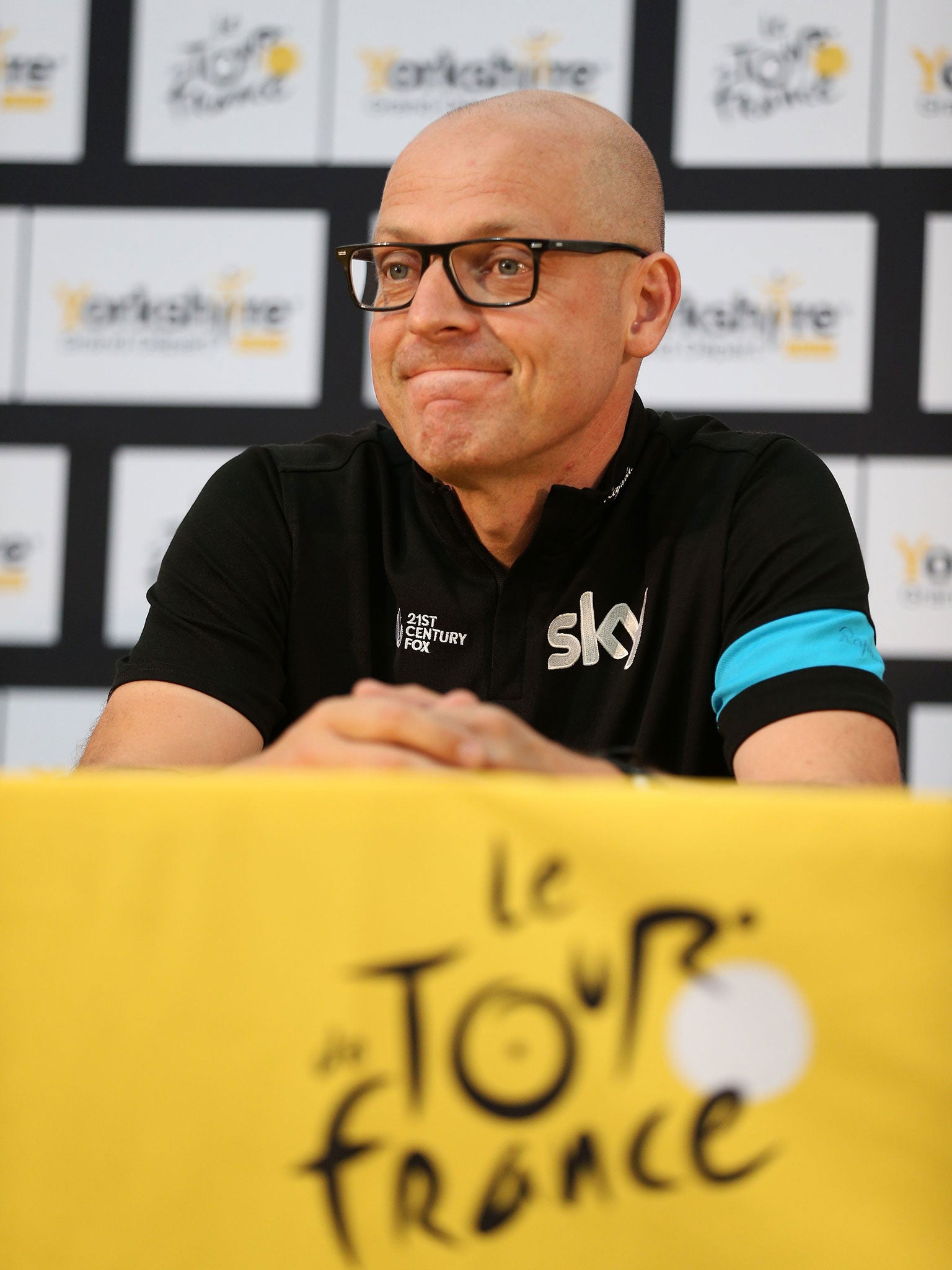Dave Brailsford: The acid test is how Sky come back from bad luck
Mark Cavendish, back at the Tour for a day, says he is still uncertain when he will return to racing

Your support helps us to tell the story
From reproductive rights to climate change to Big Tech, The Independent is on the ground when the story is developing. Whether it's investigating the financials of Elon Musk's pro-Trump PAC or producing our latest documentary, 'The A Word', which shines a light on the American women fighting for reproductive rights, we know how important it is to parse out the facts from the messaging.
At such a critical moment in US history, we need reporters on the ground. Your donation allows us to keep sending journalists to speak to both sides of the story.
The Independent is trusted by Americans across the entire political spectrum. And unlike many other quality news outlets, we choose not to lock Americans out of our reporting and analysis with paywalls. We believe quality journalism should be available to everyone, paid for by those who can afford it.
Your support makes all the difference.After two years of media mayhem for Team Sky en route to taking back-to-back yellow jerseys in Paris, the ease with which they found a parking space at their hotel on yesterday’s Tour de France rest day was a reflection of how much the British team’s fortunes have plummeted in 12 months. But inside the building, team principal Sir Dave Brailsford was already plotting how to fight back on the Tour’s remaining six days – and beyond.
“We’re not in the same scenario as 2010 [when Sir Bradley Wiggins dropped to 24th overall after failing to perform at his 2009 level],” Brailsford insisted. “That was our first Tour, we recalibrated and learned from that. This time round, it’s different. If Chris [Froome, who crashed out] were here, he would be equally as good as [race leader Vincenzo] Nibali.
“Since 2010 we’ve won the Tour twice, we’ve won quite a lot, but the danger is that you’re very confident. Sport’s cyclical, this [losing] is part of it, and it’s how you react to it that is the acid test.”
The most essential part of the reaction? “You keep on fighting, you never give in.” Despite Froome’s abandonment and new team leader Richie Porte’s inability to last the pace, Brailsford chose to accentuate the positives in relation to Sky’s seven remaining Tour team riders. “I think they’re doing really well, moved on really quickly, I can’t fault the lads,” he said.
“It’s everything that we do as staff, it’s a question of, can we still go the extra mile, can we maintain the morale right through to the bitter end? Even though it’s not gone our way.”
Meanwhile, Mark Cavendish, back at the Tour for a day, said he was still uncertain when he will return to racing. The British sprinter crashed badly and abandoned on the Tour’s opening stage, suffering a shoulder injury and damaging his ligaments.
“I only got back on the road yesterday riding my bike and obviously I can’t be competing until I’m guaranteed that there will be no more shoulder damage,” the Omega Pharma-Quickstep rider said.
His team doctor, Helge Riepenhof, said: “He’s training hard on the home-trainer to keep his fitness. Normally after an injury like this you look at a six-week window [of recovery]. That would be for racing again. But it’s one thing just to be in a race, another thing to sprint for a win because you have to pull on the handlebars.
“All these movements, [like] bringing your shoulder backwards – especially in the style he sprints – is very painful. Then in the following six weeks, the pain decreases; riders can sprint but the injuries are still sore. That’s why it would limit performance.
“I think it’s important if he can do some more racing this season, and then really start the next season very strongly and that he’s ready to start really going for wins from the beginning of 2015. Otherwise it could be too much time between intense periods of racing.”
Racing at the Tour, meanwhile, resumes today with the first of three Pyrenean stages. The toughest climb, the Port de Balès, memorably featured in the 2010 Tour when race leader Andy Schleck had a mechanical incident near the summit and arch-rival Alberto Contador attacked, taking the top spot overall.
This time round, with Nibali looking increasingly solid in the overall lead, the battle is more likely to centre on the right to stand beside the Italian in Paris.
Join our commenting forum
Join thought-provoking conversations, follow other Independent readers and see their replies
Comments